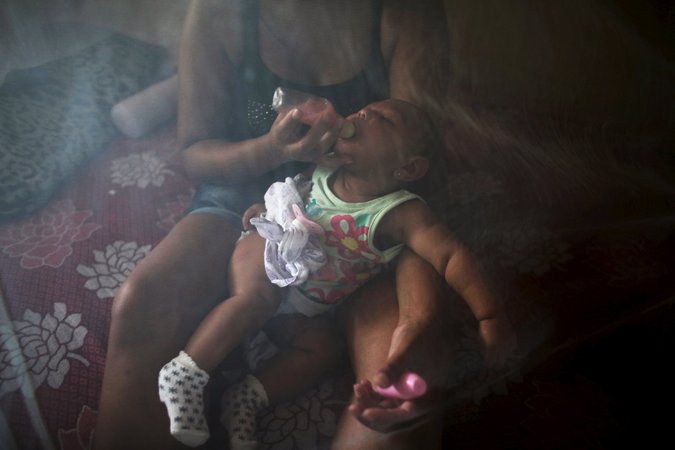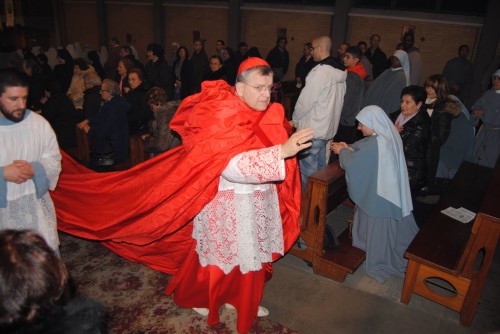
As the Zika virus spreads in Latin America, Catholic leaders are warning women against using contraceptives or having abortions, even as health officials in some countries are advising women not to get pregnant because of the risk of birth defects.
The challenge posed by Zika for the Roman Catholic Church comes as Pope Francis is making his first trip to Mexico, where the virus appears to be spreading.
After a period of saying little, bishops in Latin America are beginning to speak up and reassert the church’s opposition to birth control and abortion — positions that in Latin America are unpopular and often disregarded, even among Catholics.
“Contraceptives are not a solution,” said Bishop Leonardo Ulrich Steiner, the secretary general of the National Council of Bishops of Brazil, and an auxiliary bishop of Brasília, in an interview. “There is not a single change in the church’s position.”
He urged couples to practice chastity or use “natural family planning,” a method in which women monitor their menstrual cycles and abstain from sex when they are fertile.
This is not a stance likely to win many new followers. South America happens to be the continent with the highest proportion of Catholics who already disagree with the church on abortion and birth control, according to a large international poll commissioned by Univision in 2014. Seventy-three percent of Catholics in Latin America said that abortion should be allowed in some or all cases, and 91 percent supported the use of contraceptives — a higher percentage even than in Europe or the United States.
While church leaders frequently say that doctrine is not determined by polls or popularity contests, they are nevertheless sensitive to counts of their flock. And the Catholic Church has been losing adherents in Latin America in recent decades as people leave to join evangelical and Pentecostal churches, or reject religion entirely.
Nearly 70 percent of adults in Latin America still identify as Catholic, but that is down from 94 percent in 1950, according to a study by the Pew Research Center. Much of the fall-off has occurred in just the last generation.
No Vatican department has yet issued a statement about the Zika issue, and it is not clear whether Pope Francis will address it during his trip to Mexico, where he will be until Thursday, said the Rev. Thomas Rosica, the English-language media attaché to the Vatican’s press office.
“The Vatican is very well aware of the seriousness of this issue, and the Holy Father is very aware of it,” Father Rosica said. “We’re waiting to see how the local churches in those countries respond.”
But Father Rosica said church teaching on abortion and contraception remains the same. The Zika epidemic, he said, presents “an opportunity for the church to recommit itself to the dignity and sacredness of life, even in very precarious moments like this.”
The five countries in Latin America and the Caribbean that have advised women to delay pregnancy are Brazil, Ecuador, El Salvador, Colombia and Jamaica. But access to contraception is limited throughout the region, especially for poor and rural women. Abortion is restricted in many countries, and it is illegal without exceptions in the Dominican Republic, El Salvador and Nicaragua, according to the Kaiser Family Foundation.
The Zika virus is spread by mosquitoes of the Aedes genus, but researchers have found some cases transmitted by sexual contact. Experts are not yet sure whether Zika is the cause of a sudden surge in babies born in Brazil with microcephaly — unusually small heads and, often, damaged brains. Microcephaly could lead to serious disabilities — but not always.
There is no vaccine for the Zika virus, and no cure for microcephaly. The World Health Organization this month declared the Zika epidemic an international public health emergency. The organization advised that women should have full access to a range of contraceptive options, as well as “safe abortion services to the full extent of the law.”
Many church officials are wary that the Zika epidemic will lead to the loosening of laws on abortion and contraception. Cardinal Óscar Rodríguez Maradiaga of Honduras, who serves on Pope Francis’ nine-member advisory council, denounced the notion of “therapeutic abortions” for women carrying babies with microcephaly. He spoke at a Mass attended by the Honduran president and first lady.
“Therapeutic means curative, and abortion doesn’t cure anything,” he said, according to a report in the newspaper La Tribuna. “It takes innocent lives away.”
Cardinal Odilo Scherer of São Paulo said recently that mothers must accept babies born with microcephaly “as a mission,” and that abortion was out of the question. However, he appeared to open a door to using condoms, saying that is “personal choice” because a new life has not yet been formed.
The papal encyclical Humanae Vitae, issued by Pope Paul VI in 1968, said that artificial contraception was forbidden because sexual intercourse must always be open to procreation.
“The teaching is fairly clear that contraception is not ethically permissible,” said Christopher Kaczor, a professor of philosophy at Loyola Marymount University, in Los Angeles, and a corresponding member of the Vatican’s Pontifical Academy for Life.
“That doesn’t mean a couple has to have a child,” he said, because it is possible to use natural family planning methods.
He and other Catholic scholars cited a study showing that when used properly, natural family planning is as effective as birth control pills. However, the United States Department of Health and Human Services reports that the failure rate for natural family planning is 25 out of 100 women, while for birth control pills it is five out of 100.
Other Catholic moral theologians say the church’s ban is not so clear-cut. The Rev. James Bretzke, a moral theologian at Boston College, said that some theologians interpreted a passage in Humanae Vitae as an “escape clause” that essentially permitted women to use an artificial means of contraception if it had the effect of curing or treating disease — for example, using birth control pills to treat menstrual pain or acne. Theologians could apply the same approach to the Zika situation, he said.
“My prediction is this Zika virus is going to reignite the unresolved debate that’s existed since 1968 about the moral status of artificial contraception when applied to extraordinary cases,” Father Bretzke said.
“Now we have not just an individual extraordinary case, but a situation in which these cases are extraordinary for a large group of people,” he said. “You’ve got one competing value — to have every act open to procreation — running up against another competing value — which is to protect the public health.”
The Catholic Church faced intense pressure as the AIDS epidemic spread to lift its ban on the use of condoms to help prevent transmission of the disease. Some nuns and priests who treated AIDS patients, and even the South African Bishops Conference, publicly said that the church should make an exception for married couples to use condoms when one partner tested positive for H.I.V.
Then in 2010, Pope Benedict XVI was quoted in a book saying that in some exceptional cases, when the motivation is to prevent disease rather than pregnancy, using a condom could be a “first step” towards moral responsibility. He said that this might be the case for a prostitute who uses a condom. Benedict’s remark set off widespread controversy and speculation about whether the Vatican would officially issue an exception or change to doctrine. But none came.
Complete Article HERE!




